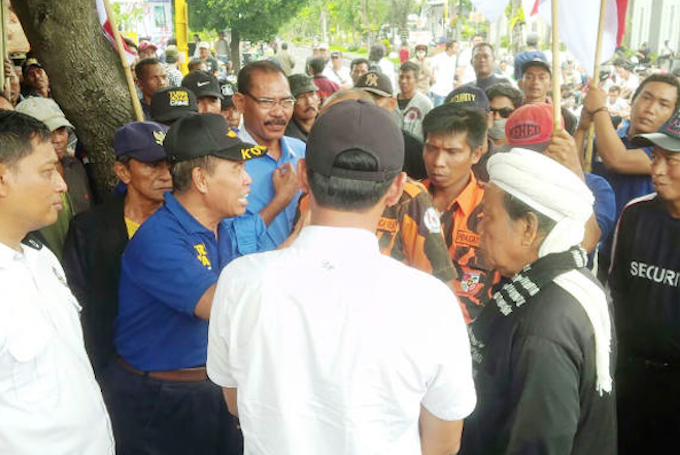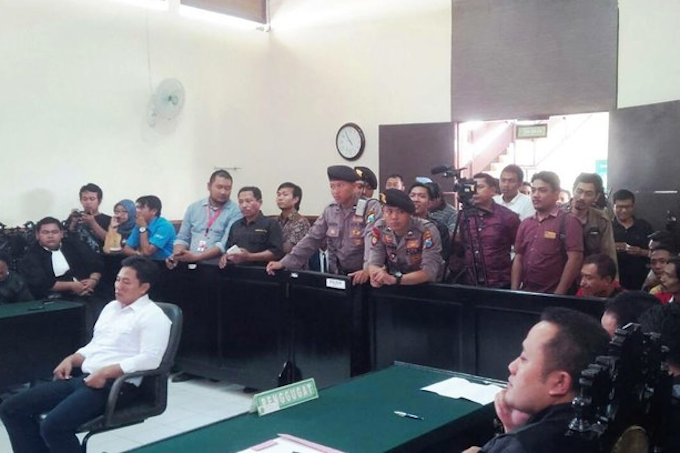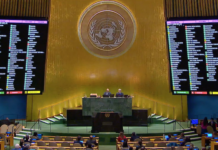
By Yovinus Guntur in Banyuwangi, Indonesia
An Indonesian court has convicted and sentenced an environmentalist to 10 months in prison on a charge of spreading communism by carrying a hammer-and-sickle banner at a protest last year.
The prosecutor at the Banyuwangi District Court, in East Java province, had sought a seven-year sentence for defendant 37-year-old Hari Budiawan (alias Budi Pego).
Communism has been outlawed in the country since the mid-1960s, when a bloody purge against suspected members of the Indonesian Communist Party (PKI) occurred.
A panel of judges ruled on Tuesday that Budi was guilty of a charge against “those who publicly commit crimes verbally, written, or through other media, spread or develop communism, Marxism, Leninism in any attempt”.
“The prosecution proved convincingly that the defendant committed a criminal offence against the state,” chief judge Putu Endru Sonata ruled. “Therefore he must serve 10 months in prison.”
On September 4, 2017, Budi was taken into custody and charged with carrying a banner that displayed communist symbols during an anti-mining protest in East Java in April 2017, causing public unrest.
The court ruled on the lesser sentence because the defendant had never been involved in criminal acts.
Important evidence
The banner’s hammer and sickle logo – the symbol of the liquidated PKI – was important evidence leading to the conviction, Putu told BenarNews.
Budi expressed disappointment.
“I am innocent and cannot accept the verdict,” he said.
Lawyer Ahmad Rifai said the picture showing what looks like the PKI symbol on the banner could not be called a symbol of communism, adding that “the verdict has threatened democracy in Banyuwangi”.
Budi has seven days to decide if he will appeal.
Herlambang P. Wiratraman, the chief of the Centre for Human Rights Law Studies at Airlangga University in Surabaya, agreed with Rifai.
“The stigma of communism became the easiest tool to stop activists who resisted mining in Banyuwangi,” he said.
‘Judicial repression’
Amnesty International (AI) Indonesia also condemned the verdict, calling Budi a prisoner of conscience.
“This is a form of judicial repression against the constitutional rights of citizens to have opinions.
“A higher judicial authority” should immediately release Budi because he had “fought for the preservation of the environment and the rights of the people around Tumpang Pitu Mountain Protected Forest,” AI Indonesia director Usman Hamid said in a written statement.
“The judge should protect fundamental rights, namely the right of expression guaranteed by the constitution” by releasing Budi, Usman said.
In September, after Budi was arrested, fellow activist Agnes Dave questioned the authenticity of the banner.
“Local police and residents were also there. If the activists made such a banner displaying the hammer and sickle, they would have been aware. Police could have stopped the protest and arrested anyone joining in,” she said at the time.
Protesters gathered
While Budi was inside the courtroom learning his fate, hundreds of his supporters and anti-communist protesters gathered outside as police officers armed with a water cannon watched over them.
Members of the Anti-Communist Revival Movement (GAKK) said they supported the guilty verdict and sentencing.
“This is a proof that in Banyuwangi there is indeed a new style of communist revival,” said H. Abdillah Rafsanjani, an organiser of the GAKK protests.
Communism was declared illegal in Indonesia after PKI sympathizers allegedly killed 62 members of Ansor, the youth wing of the largest Indonesian Muslim organisation, Nahdlatul Ulama, on October 18, 1965.
Human rights organisations estimate that between 500,000 and 1 million Indonesians died during nationwide killings that targeted suspected PKI members in 1965 and 1966.













































